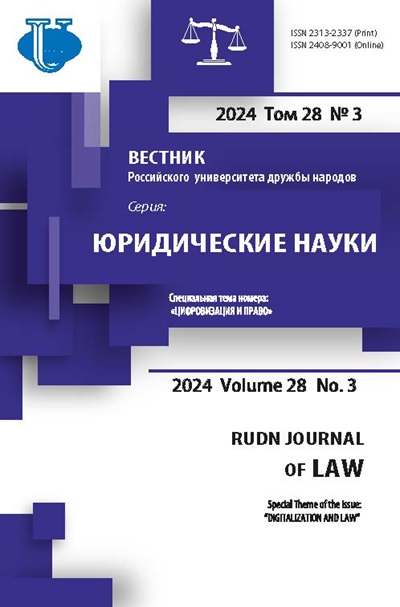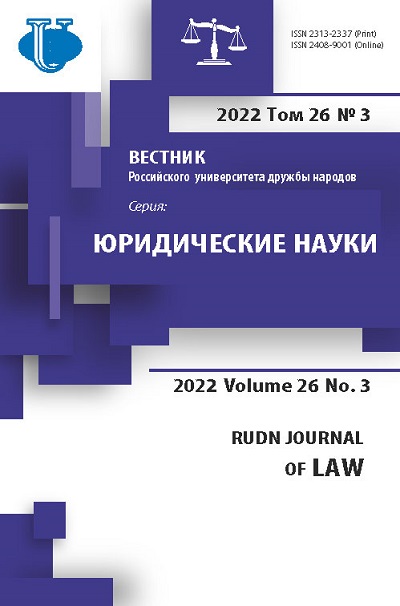Влияют ли конституционные принципы на самореализацию молодежи?
- Авторы: Певцова Е.А.1, Умнова-Конюхова И.А.2, Алешкова И.А.2
-
Учреждения:
- Московский государственный областной университет
- Институт научной информации по общественным наукам (ИНИОН) РАН
- Выпуск: Том 26, № 3 (2022)
- Страницы: 611-633
- Раздел: КОНСТИТУЦИОННОЕ И МУНИЦИПАЛЬНОЕ ПРАВО
- URL: https://journals.rudn.ru/law/article/view/31833
- DOI: https://doi.org/10.22363/2313-2337-2022-26-3-611-633
Цитировать
Полный текст
Аннотация
Влияние конституционных принципов на сознание молодежи является фундаментальной проблемой. В совокупности конституционные и моральные принципы лежат в основе поведения молодых людей в обществе. Они имеют большое значение в процессе воспитания гражданственности. В данной статье рассматриваются особенности самореализации молодежи в России. Мы провели социологический опрос более 200 студентов высших учебных заведений, большинство из которых участвуют в деятельности молодежных общественных организаций в различных сферах: спорт, политика, экология, патриотическое воспитание, благотворительность и т.д. и выяснили, что те, кто активно реализовывал свои таланты и способности, стремились проявить себя в науке и обществе, были мотивированы именно эффективностью конституционных принципов и очень хорошо знали содержание правовых предписаний, конкретизирующих конституционные принципы. Многие молодые люди воспринимают конституционные принципы как гарантии своих правовых возможностей, которые определяют основу их взаимодействия с другими субъектами права. Кроме того, было установлено, что правовые и моральные ценности, сформированные в сознании молодого человека, в совокупности обеспечивают понимание содержания конституционных принципов и соответственно влияют на поведение молодого человека в процессе самореализации.
Ключевые слова
Об авторах
Елена Александровна Певцова
Московский государственный областной университет
Email: pevtsova@bk.ru
ORCID iD: 0000-0002-2750-6680
доктор юридических наук, профессор, Ректор
Российская Федерация, 105005, г. Москва, ул. Радио, д. 10АИрина Анатольевна Умнова-Конюхова
Институт научной информации по общественным наукам (ИНИОН) РАН
Email: ikonyukhova@yandex.ru
ORCID iD: 0000-0001-6400-851X
доктор юридических наук, профессор, ведущий научный сотрудник
Российская Федерация, 117418, г. Москва, Нахимовский проспект, д. 51/21Ирина Александровна Алешкова
Институт научной информации по общественным наукам (ИНИОН) РАН
Автор, ответственный за переписку.
Email: ialeshkova@mail.ru
ORCID iD: 0000-0001-5054-5939
кандидат юридических наук, доцент, старший научный сотрудник
Российская Федерация, 117418, г. Москва, Нахимовский проспект, д. 51/21Список литературы
- Albert, R. & Kenny, D. (2018) The challenges of constitutional silence: Doctrine, theory, and applications. International Journal of Constitutional Law. 16(3), 880-886. https://doi.org/10.1093/icon/moy066
- Alexy, R. (2014) Formal principles: Some replies to critics. International Journal of Constitutional Law. 12(3), 511-524. https://doi.org/10.1093/icon/mou051
- Анцыферова Л.И. К психологии личности как развивающейся системе // Психология формирования и развития личности / отв. ред. Л.И. Анцыферова. М.: Наука, 1981. С. 3-19.
- Arcioni, E. & Stone, A. (2016) The small brown bird: Values and aspirations in the Australian Constitution. International Journal of Constitutional Law 14(1), 60-79. https://doi.org/10.1093/icon/mow003
- Ардашкин И.Б. «Антропологизация» как фактор проблематизации в познании // Известия Томского политехнического университета. 2006. Т. 309. № 1. С. 217-220.
- Авакьян С.А. Глобализация, общие конституционные ценности и национальное регулирование // Национальные интересы. 2001. № 4. С. 44-47.
- Аюпова А.Х. Особенности самореализации Российской молодежи: социокультурный анализ // Вестник Кемеровского государственного университета. 2014. № 3-1 (59). С. 88-91.
- Blair, T. (1996) New Britain: My Vision of a Young Country. London, Fourth Estate.
- Blunkett, D. (2002) Integration with Diversity: Globalisation and the Renewal of Democracy and Civil Society. In: Griffth, P. & Leonard, M. (eds.), Rethinking Britishness. London, Foreign Policy Centre, pp. 65-77.
- Бондарь Н.С. Конституционные ценности - категория действующего права (в контексте практики Конституционного Суда Росси) // Журнал Конституционного правосудия. 2009. №6. С. 1-11.
- Бондарь Н.С. Конституционализация социально-экономического развития российской государственности (в контексте решений Конституционного Суда РФ). М.: Викор- Медиа, 2006. 223 с.
- Calliess, C., & Van der Schyff, G. (eds.). (2019) Constitutional Identity in a Europe of Multilevel Constitutionalism. Cambridge, Cambridge University Press. https://doi.org/10.1017/9781108616256
- Castellino, J. (2020) The Rise of Majorities and Emerging Existential Threats to India and China. The Chinese Journal of Comparative Law. 8 (3), 538-557. https://doi.org/10.1093/cjcl/cxaa018
- Coffey, D.K. & Barak, A. (2016) Human Dignity: The Constitutional Value and the Constitutional Right. Human Rights Law Review. 16(1), 175-176. https://doi.org/10.1093/hrlr/ngv042
- Crick, B. (2002) Education for Citizenship: The Citizenship Order. Parliamentary Affairs. 55 (3), 488-504.
- Crick, B. (2004) Education for Democratic Citizenship: Issues of Theory and Practice. Lockyer A. (ed.). 1st ed. Routledge. https://doi.org/10.4324/9781315256948
- Dani, M. (2018) Ai confini della Costituzione. Principi supremi e identità costituzionale [At the Boundaries of the Constitution. Supreme Principles and Constitutional Identity]. International Journal of Constitutional Law, 16(1), 302-306. https://doi.org/10.1093/icon/moy031
- Ferguson, K.M. (2007) Implementing a social enterprise intervention with Homeless, Street-Living Youths in Los Angeles. Social Work. 52(2), 103-112. https://doi.org/10.1093/sw/52.2.103
- Finn, J.L. & Checkoway, B. (1998) Young people as competent community builders: A Challenge to Social Work. Social Work. 43(4), 335-345. https://doi.org/10.1093/sw/43.4.335
- Горлова Н.И. Становление и развитие института волонтерства в России: история и современность. М.: Российский научно-исследовательский институт культурного и природного наследия им. Д.С. Лихачева, 2019. 290 с.
- Grimm, D. (2018) Constitutional jurisprudence observed by a political scientist. International Journal of Constitutional Law. 16 (1), 280-281. https://doi.org/10.1093/icon/moy032
- Истомина О.Б., Штыков Н.Н. Ценностное мировоззрение в системе деятельности // Евразийский юридический журнал. 2021. № 1 (152). С. 471-472.
- Habermas, J. (1998) “Reasonable” versus “True,” or the Morality of Worldviews. In: Cronin C. & De Geiff, P. eds. The Inclusion of Other: Studies in Political Theory. Сambridge, MA: The MIT Press.
- Кочетков A.B. Конституционализация государственной молодежной политики в России // Закон и право. 2009. № 9. С. 10-13.
- Костин С.А., Тыртышный А.А., Касс К.Г. Современные подходы к правовому просвещению молодежи в Российской Федерации: опыт реализации проектных технологий // Конституционное и муниципальное право. 2020. № 7. С. 55-61. https://doi.org/10.18572/1812-3767-2020-7-55-61
- Latham-Gambi, A. (2020) Political Constitutionalism and Legal Constitutionalism - an Imaginary Opposition? Oxford Journal of Legal Studies. 40(4), 737-763. https://doi.org/10.1093/ojls/gqaa046
- Мамонов В.В. Конституционные ценности современной России // Вестник Саратовской государственной юридической академии. 2013. № 4 (93). С. 125-132.
- Mantha-Hollands, A. & Orgad, L. (2020) Citizenship at a crossroad. International Journal of Constitutional Law. 18 (4), 1522-1525. https://doi.org/10.1093/icon/moaa107
- Ming-Sung Kuo (2021) Authenticity: The Ultimate Challenge in the Quest for Lasting Constitutional Legitimacy. Oxford Journal of Legal Studies. 41 (1), 265-287. https://doi.org/10.1093/ojls/gqaa022
- Möller, K. (2007) Balancing and the structure of constitutional rights. International Journal of Constitutional Law. 5 (3), 453-468. https://doi.org/10.1093/icon/mom023
- Mycock, A. & Tonge, J. (2012) The Party politics of youth citizenship and democratic engagement. Parliamentary Affairs. 65 (1), 138-161.
- Нерсесянц В.С. Право как необходимая форма равенства, свободы и справедливости // Социологические исследования. 2001. № 10. С. 3-15.
- Нигматуллина И.В., Рассолова И.Ю. Особенности профессионального самоопределения как стержневой активности при формировании личности // Евразийский юридический журнал. 2021. № 1 (152). С. 473-474.
- Phillips, A. (1991) Citizenship and youth. Parliamentary Affairs. 44(4), 541-548. https://doi.org/10.1093/oxfordjournals.pa.a052324
- Певцова Е.А., Алешкова И.А. Принципы государственной молодежной политики: тенденции и особенности развития // Вестник Московского государственного областного университета. Серия: Юриспруденция. 2020. № 3. С. 51-59. https://doi.org/10.18384/2310-6794-2020-3-51-59
- Perez-Gramaje, A.F., Garcia, O.F., Reyes, M., Serra, E., & Garcia, F. (2020) Parenting styles and aggressive adolescents: Relationships with self-esteem and personal maladjustment. The European Journal of Psychology Applied to Legal Context. (12), 1-10. https://doi.org/10.5093/ejpalc2020a1
- Perju, V.F. (2009) The Migration of Constitutional Ideas. International Journal of Constitutional Law. 7 (1), 170-174. https://doi.org/10.1093/icon/mon021
- Ruiz-Hernández, J.A., Moral-Zafra, E., Llor-Esteban, B., & Jiménez-Barbero, J.A. (2019) Influence of parental styles and other psychosocial variables on the development of externalizing behaviors in adolescents: A systematic review. The European Journal of Psychology Applied to Legal Context. (11), 9-21. https://doi.org/10.5093/ejpalc2018a11
- Шафиров В.М. Человеческое измерение и применение права // Российская юстиция. 2018. № 11. С. 28-31.
- Shephard, M., & Patrikios, S. (2012) Making Democracy work through early formal engagement? Comparative study of youth parliaments in the EU. Parliamentary Affairs. 66 (4), 752-771.
- Sloam, J. (2010) Introduction: youth, citizenship, and political science education: Questions for the discipline. Journal of Political Science Education. 6 (4), 325-335. https://doi.org/10.1080/15512169.2010.518085
- Stone, A. & Weis, L.K (2021) Positive and negative constitutionalism and the limits of universalism: a review essay. Oxford Journal of Legal Studies. 41 (4), 1249-1271. https://doi.org/10.1093/ojls/gqab012
- Sullivan, E.M., Sullivan, N.E., Cox, D.H., Butt, D., Dollemont, C. & Shallow, M. (2011) ‘You are taking who?! to a national conference on social policy?’: A place for youth in the social policy life of their communities. Community Development Journal. 46 (4), 511-525.
- Tonge, J., Mycock, A., & Jeffery, B. (2012) Does Citizenship education make young people better-engaged citizens? Political Studies. 60 (3), 578-602. https://doi.org/10.1111/j.1467-9248.2011.00931.x
- Умнова (Конюхова) И.А. Конституционное право и международное публичное право: теория и практика взаимодействия. М.: РГУП, 2016. 672 с.
- Умнова (Конюхова) И.А. Тенденции конституционного развития и конституционного правоприменения в условиях глобализации угроз и вызовов человечеству / И. А. Умнова Конюхова // Государство и право. 2018. № 2. С. 19-26.
- Velasco Rivera, M.A (2019) Plea for Demystifying Constitutional Theory Categories. The American Journal of Comparative Law. 67(2), 483-490. https://doi.org/10.1093/ajcl/avz016
- Конституция Российской Федерации: доктрина и практика: Материалы научно-практической конференции, посвященной 15-летию Конституции Российской Федерации и 60-летию Всеобщей декларации прав человека. Санкт-Петербург, 13-14 ноября 2008 г. / отв. ред. В.Д. Зорькин. М.: Норма, 2009. 320 с.
- Weis, L.K, (2017) Constitutional Directive Principles. Oxford Journal of Legal Studies. 37 (4), 916-945. https://doi.org/10.1093/ojls/gqx015
- Яницкий М.С., Серый А.В., Браун О.А., Балабащук Р.О. Ценностно-смысловая направленность и социокультурные детерминанты образа собственного будущего студенческой молодежи // Известия Иркутского государственного университета. Серия: Психология. 2019. Т. 30. С. 92-103. https://doi.org/10.26516/2304-1226.2019.30.92
- Zakirova, L.М. & Frolova, I.I. (2014) Success of training activities depending on the level of social intelligence. Asian Social Science. 10(24), 112-119. https://doi.org/10.5539/ass.v10n24p112
- Zhou, H.R. (2019) Legal principles, constitutional principles, and judicial review. The American Journal of Comparative Law. 67(4), 899-930. https://doi.org/10.1093/ajcl/avz028
- Зорькин В.Д. Конституция РФ - правовая основа интеграции российского общества // Государство и право. 2018. № 12. С. 5-17. https://doi.org/10.31857/S013207690002196-7
















